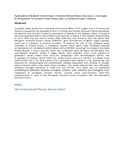| dc.contributor.author | Muoma, John Vincent Omondi | |
| dc.contributor.author | Ombori, Omwoyo | |
| dc.date.accessioned | 2021-06-09T07:11:08Z | |
| dc.date.available | 2021-06-09T07:11:08Z | |
| dc.date.issued | 2014-03 | |
| dc.identifier.uri | https://doi.org/10.4236/AJPS.2014.56100 | |
| dc.identifier.uri | https://www.scirp.org/journal/paperinformation.aspx?paperid=44120 | |
| dc.identifier.uri | http://ir-library.mmust.ac.ke/123456789/1666 | |
| dc.description.abstract | Currently maize production in the East and Central Africa (ECA) region is at 1.3 tonnes per hectare compared to the potential of up to 7.0 tonnes per hectare because of biotic and abiotic constraints, and this has resulted in prevalence of famine in sub-Saharan Africa. Drought is the most important abiotic stress affecting productivity of maize in Sub Saharan Africa leading to up to 70% crop loss and in certain cases total crop loss. Previous work has shown that Mitogenic Activated Protein Kinase (MAPKKK) gene activated an oxidative signal cascade, which led to tolerance to adverse condition. To analyze the role of the oxidative signal cascades on tropical maize, 4 transgenic tropical maize plants were developed through an Agrobacterium-mediated transformation with a MAPKKK homology from tobacco Nicotiana Protein Kinase 1 (npk1) and the insert was confirmed using Southern and Northern blot hybridization analysis. Fertile To maize plants were obtained which were planted to generate T1 plants, which were used for comparison with non-transgenic plants. The T1 plantlets of tropical inbred TL08-(2)4, single hybrid cross of a PTL001, a multiple cross hybrid DH01 and a dry land cultivar DLC1 genotypes were planted in the greenhouse and assessed for morphological and physiological changes associated with increase in drought stress tolerance when under water stress condition. The results showed that npk1 effectively enhanced drought tolerance in TL08-(2)4 and PTL001, and there was no significant morphological difference between transgenic controls (well watered) and transgenic tests (subjected to moderate drought stress). Overall, there were between 20%-35% enhancements of yield of the transgenic stressed events compared with non-transgenic stressed control. | en_US |
| dc.language.iso | en | en_US |
| dc.publisher | American Journal of Plant Sciences | en_US |
| dc.subject | Agrobacterium,Mediated,Transformation, Maize, Genotypes, Introgression, Nicotiana ,Protein,Kinase, Drought,Tolerance | en_US |
| dc.title | Agrobacterium-Mediated Transformation of Selected Kenyan Maize (Zea mays L.) Genotypes by Introgression of Nicotiana Protein Kinase (npk1) to Enhance Drought Tolerance | en_US |
| dc.type | Article | en_US |

